模拟联合国朝核问题决议草案(英美韩)
模拟联合国决议草案(最终)
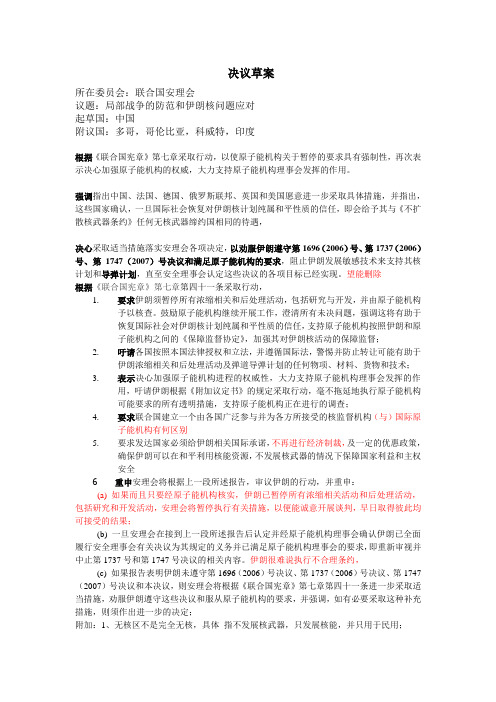
决议草案所在委员会:联合国安理会议题:局部战争的防范和伊朗核问题应对起草国:中国附议国:多哥,哥伦比亚,科威特,印度根据《联合国宪章》第七章采取行动,以使原子能机构关于暂停的要求具有强制性,再次表示决心加强原子能机构的权威,大力支持原子能机构理事会发挥的作用。
强调指出中国、法国、德国、俄罗斯联邦、英国和美国愿意进一步采取具体措施,并指出,这些国家确认,一旦国际社会恢复对伊朗核计划纯属和平性质的信任,即会给予其与《不扩散核武器条约》任何无核武器缔约国相同的待遇,决心采取适当措施落实安理会各项决定,以劝服伊朗遵守第1696(2006)号、第1737(2006)号、第1747(2007)号决议和满足原子能机构的要求,阻止伊朗发展敏感技术来支持其核计划和导弹计划,直至安全理事会认定这些决议的各项目标已经实现。
望能删除根据《联合国宪章》第七章第四十一条采取行动,1.要求伊朗须暂停所有浓缩相关和后处理活动,包括研究与开发,并由原子能机构予以核查。
鼓励原子能机构继续开展工作,澄清所有未决问题,强调这将有助于恢复国际社会对伊朗核计划纯属和平性质的信任,支持原子能机构按照伊朗和原子能机构之间的《保障监督协定》,加强其对伊朗核活动的保障监督;2.吁请各国按照本国法律授权和立法,并遵循国际法,警惕并防止转让可能有助于伊朗浓缩相关和后处理活动及弹道导弹计划的任何物项、材料、货物和技术;3.表示决心加强原子能机构进程的权威性,大力支持原子能机构理事会发挥的作用,吁请伊朗根据《附加议定书》的规定采取行动,毫不拖延地执行原子能机构可能要求的所有透明措施,支持原子能机构正在进行的调查;4.要求联合国建立一个由各国广泛参与并为各方所接受的核监督机构(与)国际原子能机构有何区别5.要求发达国家必须给伊朗相关国际承诺,不再进行经济制裁,及一定的优惠政策,确保伊朗可以在和平利用核能资源,不发展核武器的情况下保障国家利益和主权安全6 重申安理会将根据上一段所述报告,审议伊朗的行动,并重申:(a) 如果而且只要经原子能机构核实,伊朗已暂停所有浓缩相关活动和后处理活动,包括研究和开发活动,安理会将暂停执行有关措施,以便能诚意开展谈判,早日取得彼此均可接受的结果;(b) 一旦安理会在接到上一段所述报告后认定并经原子能机构理事会确认伊朗已全面履行安全理事会有关决议为其规定的义务并已满足原子能机构理事会的要求,即重新审视并中止第1737号和第1747号决议的相关内容。
决议草案(模联)
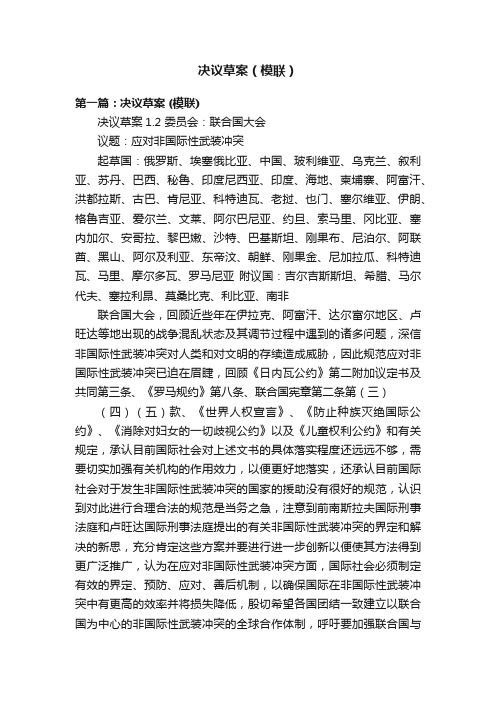
决议草案(模联)第一篇:决议草案 (模联)决议草案1.2 委员会:联合国大会议题:应对非国际性武装冲突起草国:俄罗斯、埃塞俄比亚、中国、玻利维亚、乌克兰、叙利亚、苏丹、巴西、秘鲁、印度尼西亚、印度、海地、柬埔寨、阿富汗、洪都拉斯、古巴、肯尼亚、科特迪瓦、老挝、也门、塞尔维亚、伊朗、格鲁吉亚、爱尔兰、文莱、阿尔巴尼亚、约旦、索马里、冈比亚、塞内加尔、安哥拉、黎巴嫩、沙特、巴基斯坦、刚果布、尼泊尔、阿联酋、黑山、阿尔及利亚、东帝汶、朝鲜、刚果金、尼加拉瓜、科特迪瓦、马里、摩尔多瓦、罗马尼亚附议国:吉尔吉斯斯坦、希腊、马尔代夫、塞拉利昂、莫桑比克、利比亚、南非联合国大会,回顾近些年在伊拉克、阿富汗、达尔富尔地区、卢旺达等地出现的战争混乱状态及其调节过程中遇到的诸多问题,深信非国际性武装冲突对人类和对文明的存续造成威胁,因此规范应对非国际性武装冲突已迫在眉睫,回顾《日内瓦公约》第二附加议定书及共同第三条、《罗马规约》第八条、联合国宪章第二条第(三)(四)(五)款、《世界人权宣言》、《防止种族灭绝国际公约》、《消除对妇女的一切歧视公约》以及《儿童权利公约》和有关规定,承认目前国际社会对上述文书的具体落实程度还远远不够,需要切实加强有关机构的作用效力,以便更好地落实,还承认目前国际社会对于发生非国际性武装冲突的国家的援助没有很好的规范,认识到对此进行合理合法的规范是当务之急,注意到前南斯拉夫国际刑事法庭和卢旺达国际刑事法庭提出的有关非国际性武装冲突的界定和解决的新思,充分肯定这些方案并要进行进一步创新以便使其方法得到更广泛推广,认为在应对非国际性武装冲突方面,国际社会必须制定有效的界定、预防、应对、善后机制,以确保国际在非国际性武装冲突中有更高的效率并将损失降低,殷切希望各国团结一致建立以联合国为中心的非国际性武装冲突的全球合作体制,呼吁要加强联合国与区域性组织的协调与合作,以便更好地应对非国际性武装冲突,根据《联合国宪章》、《日内瓦公约》及其相关议定书采取措施,第一条完善对于非国际性武装冲突的界定:(一)依据武装对抗双方中非政府武装团体的身份进行界定;(子)申明若其中非政府武装团体为恐怖组织,则该冲突不应为非国际性武装冲突;(丑)申明若其中非政府武装团体为宗教组织;(甲)若该国为定有国教的、政教合一的国家,且该冲突的影响仅限于本国之内,则应属于非国际性武装冲突;(乙)若该国家未定有国教但宗教信仰自由,则该冲突仅视其是否影响到他国同宗教教徒,界定其所属;(丙)若该宗教武装团体为国际极端宗教组织支持下发生武装冲突的,则该冲突应为国际性武装冲突;(寅)申明若其中非政府武装团体为雇佣兵团,则该冲突不应为非国际性武装冲突;(卯)申明若其中非政府武装团体处于外国势力的实际控制之下,并以之达成其国际性目的,则该冲突不应为非国际性武装冲突;(二)依据冲突影响程度进行界定;(子)申明若该冲突涉及到他国主权,则该冲突不应为非国际性武装冲突。
模拟联合国立场文件(美国)

Delegate:Wang Xiaoyuan Yang Jiawei Class :1 Country :The United States of America Committee: UNSC Topic: Preventing nuclear proliferation and nuclear disarmament
Similarly, the Iranian adding "NPT", despite opposition still restart nuclear research and uranium enrichment activities, dedicated access to sensitive nuclear capabilities, and the U.S. efforts to obtain nuclear capabilities of this unique interpretation believes that It is part of a nuclear weapons program. Because of the actions of these countries may change the local structure of international politics, to break the current balance, so that the fierce competition nuclear military equipment appear internationally. In several of these countries, and John spin and negotiations, it is still a tough attitude, did not play a big role. 同样的,伊朗在加入《不扩散核武器条约》后,依然不顾反对 的重启核燃料研究与铀浓缩活动,致力于获取敏感的核能力,而美 国认为对于获取这种核能力的努力的唯一解释,就是它是核武器计 划的一部分。由于这些国家所作所为有可能改变当地国际政治结构 ,打破目前的平衡,使国际上出现激烈的核备军竞赛。并且在对这 些国家多次翰旋与谈判中,其态度依旧强硬,并未起到大的作用。
朝核问题联合国决议

全与统一”的决议草案 A/62/L.4。
朝韩首脑会议于 2007 年 10 月 2 日至 4 日在平壤
2007 年 10 月 2 日至 4 日在平壤举行的朝韩首脑 举行。会议期间,卢武铉总统和金正日主席通过了《朝
会议通过了《朝韩北南关系发展与和平繁荣宣言》。 韩北南关系发展与和平繁荣宣言》。这一前所未有的
本记录包括中文发言的文本和其他语言发言的译文。更正应只对原文提出。更正应作在印发的 记录上,由有关的代表团成员一人署名,送交逐字记录处处长(C-154A)。更正将在届会结 束后编成一份单一的更正印发。
07-57312 (C)
*0757312*
A/62/PV.41
与韩朝首脑会晤齐头并进,在北京举行的最近一 轮六方会谈于 10 月 3 日结束。朝鲜民主主义人民共 和国在会谈中表示,它打算使其宁边核设施去功能 化。这两次会议的势头表明,六方会谈和韩朝关系正 以相辅相成的方式取得进展。在经济和贸易方面,也 取得了重大进展。
越南始终希望朝鲜半岛和平与稳定。我们一贯支 关系正常化。
持通过对话与和平谈判解决朝鲜半岛问题。我们支持
我们真诚希望,今天这项决议草案的通过能进一
朝鲜半岛南北人民实现和平与民族统一的强烈愿望。 步促进朝鲜民主主义人民共和国非核化进程和其他
越南十分关心和关注朝鲜半岛的事态发展。我们 未决问题的解决。
促请国际社会,特别是联合国,有力支持朝韩努力落 实在首脑会议上通过谈判取得的成果,以便他们能够 尽快实现民族和解与统一的共同目标。
美国将继续通过六方会谈和其他适当机制支持 改善东北亚各国间关系的努力。我们希望,《朝韩联 合宣言》的执行和 2005 年 9 月 19 日《联合声明》的 全面执行,将导致朝韩南北关系改善,改变东北亚面 貌,以及使朝鲜半岛全体人民过上更美好的生活。
模拟联合国大会决议草案样例
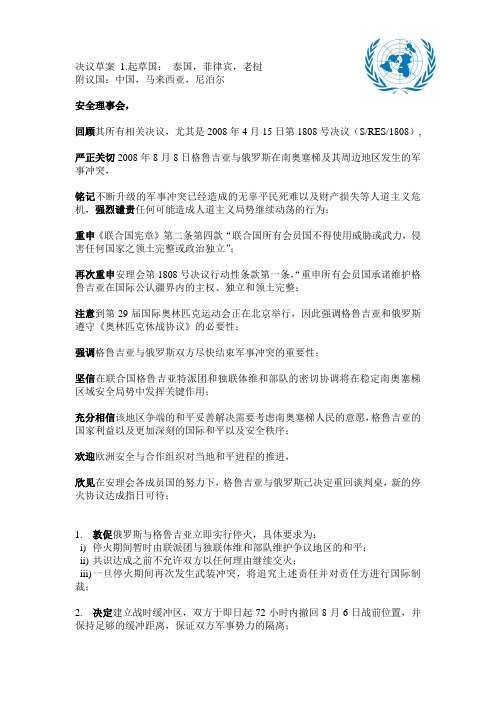
决议草案1.起草国:泰国,菲律宾,老挝附议国:中国,马来西亚,尼泊尔安全理事会,回顾其所有相关决议,尤其是2008年4月15日第1808号决议(S/RES/1808),严正关切2008年8月8日格鲁吉亚与俄罗斯在南奥塞梯及其周边地区发生的军事冲突,铭记不断升级的军事冲突已经造成的无辜平民死难以及财产损失等人道主义危机,强烈谴责任何可能造成人道主义局势继续动荡的行为;重申《联合国宪章》第二条第四款“联合国所有会员国不得使用威胁或武力,侵害任何国家之领土完整或政治独立”;再次重申安理会第1808号决议行动性条款第一条,“重申所有会员国承诺维护格鲁吉亚在国际公认疆界内的主权、独立和领土完整;注意到第29届国际奥林匹克运动会正在北京举行,因此强调格鲁吉亚和俄罗斯遵守《奥林匹克休战协议》的必要性;强调格鲁吉亚与俄罗斯双方尽快结束军事冲突的重要性;坚信在联合国格鲁吉亚特派团和独联体维和部队的密切协调将在稳定南奥塞梯区域安全局势中发挥关键作用;充分相信该地区争端的和平妥善解决需要考虑南奥塞梯人民的意愿,格鲁吉亚的国家利益以及更加深刻的国际和平以及安全秩序;欢迎欧洲安全与合作组织对当地和平进程的推进,欣见在安理会各成员国的努力下,格鲁吉亚与俄罗斯已决定重回谈判桌,新的停火协议达成指日可待;1. 敦促俄罗斯与格鲁吉亚立即实行停火,具体要求为:i) 停火期间暂时由联派团与独联体维和部队维护争议地区的和平;ii) 共识达成之前不允许双方以任何理由继续交火;iii) 一旦停火期间再次发生武装冲突,将追究上述责任并对责任方进行国际制裁;2. 决定建立战时缓冲区,双方于即日起72小时内撤回8月6日战前位置,并保持足够的缓冲距离,保证双方军事势力的隔离;3. 又决定将南奥塞梯的维和任务暂时交由联格团和独联体维和部队负责,有以下附加条件:i) 如有恶性军事冲突再次发生,允许联合国派遣调查团进入该地区进行调查,ii) 调查结果公布后,由联格团明确责任认定,并以正式书面报告形式公示,iii) 俄方接受由欧洲安全与合作组织推荐,并由联合国认定的观察员进入安全区;4. 建议迅速恢复格鲁吉亚、南奥塞梯、阿布哈兹、俄罗斯的四方会谈,并将每一次会谈成果及时向安理会报告,允许联合国代表旁听记录四方会谈的重要会议,并且:i) 追求长期和平及高加索地区问题的最终解决是四方会谈的一贯目的,这是俄方作为会谈方所作的承诺与保证,ii) 俄方默认欧安组织成员可以与四方会谈中任一方接触,充分了解会议动向;5. 赞同建立健全武器运输检察机制旨在加大监督杀伤性武器进入冲突地区的渠道与数量,提高运输武器透明度,避免过程中造成不必要的损失与误会,呼吁各国适当削减格鲁吉亚冲突地区的进攻性武器运输;6. 欣见美国同意暂缓与格鲁吉亚现行签订的安全合作协议,并在该协议到期后12个月内不同格鲁吉亚缔结任何军事安全合作协议,但对于已经存在的合作协议,其余国家不应干涉,并且欣见俄罗斯承诺不向阿布哈兹和南奥塞梯等地区输入和部署进攻性武器;7. 要求严正调查国际间武器运输走私行为并予以严厉的制裁;8. 敦促格鲁吉亚将已获得的大规模杀伤性武器上交联格团,但同时联格团必须登记。
模拟联合国大会 草案模板
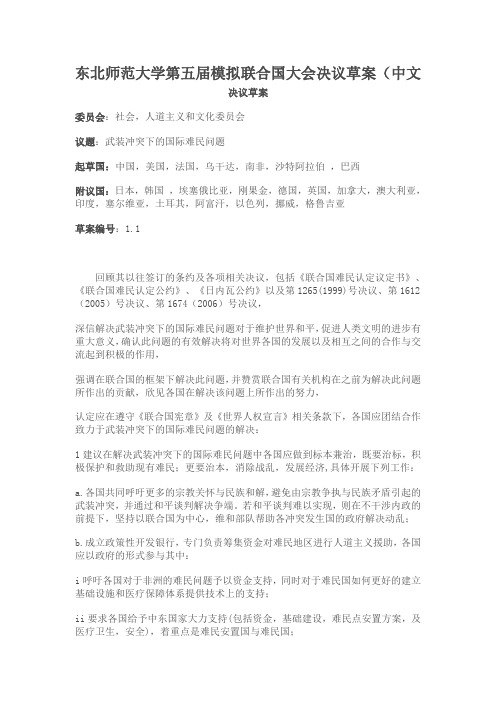
东北师范大学第五届模拟联合国大会决议草案(中文决议草案委员会:社会,人道主义和文化委员会议题:武装冲突下的国际难民问题起草国:中国,美国,法国,乌干达,南非,沙特阿拉伯,巴西附议国:日本,韩国,埃塞俄比亚,刚果金,德国,英国,加拿大,澳大利亚,印度,塞尔维亚,土耳其,阿富汗,以色列,挪威,格鲁吉亚草案编号:1.1回顾其以往签订的条约及各项相关决议,包括《联合国难民认定议定书》、《联合国难民认定公约》、《日内瓦公约》以及第1265(1999)号决议、第1612(2005)号决议、第1674(2006)号决议,深信解决武装冲突下的国际难民问题对于维护世界和平,促进人类文明的进步有重大意义,确认此问题的有效解决将对世界各国的发展以及相互之间的合作与交流起到积极的作用,强调在联合国的框架下解决此问题,并赞赏联合国有关机构在之前为解决此问题所作出的贡献,欣见各国在解决该问题上所作出的努力,认定应在遵守《联合国宪章》及《世界人权宣言》相关条款下,各国应团结合作致力于武装冲突下的国际难民问题的解决:1建议在解决武装冲突下的国际难民问题中各国应做到标本兼治,既要治标,积极保护和救助现有难民;更要治本,消除战乱,发展经济,具体开展下列工作:a.各国共同呼吁更多的宗教关怀与民族和解,避免由宗教争执与民族矛盾引起的武装冲突,并通过和平谈判解决争端。
若和平谈判难以实现,则在不干涉内政的前提下,坚持以联合国为中心,维和部队帮助各冲突发生国的政府解决动乱;b.成立政策性开发银行,专门负责筹集资金对难民地区进行人道主义援助,各国应以政府的形式参与其中:i呼吁各国对于非洲的难民问题予以资金支持,同时对于难民国如何更好的建立基础设施和医疗保障体系提供技术上的支持;ii要求各国给予中东国家大力支持(包括资金,基础建设,难民点安置方案,及医疗卫生,安全),着重点是难民安置国与难民国;2、呼吁各国尊重难民的人权,已获得其合法权利的保护,a. 强调各国应以立法的形式保障难民正当权利;b.重申《世界人权宣言》和《公民权利和政治权利国际盟约》有效性;3、支持联合国难民署的工作,并应充分发挥联合国难民署在解决难民问题上的建设性作用。
决议草案(完)
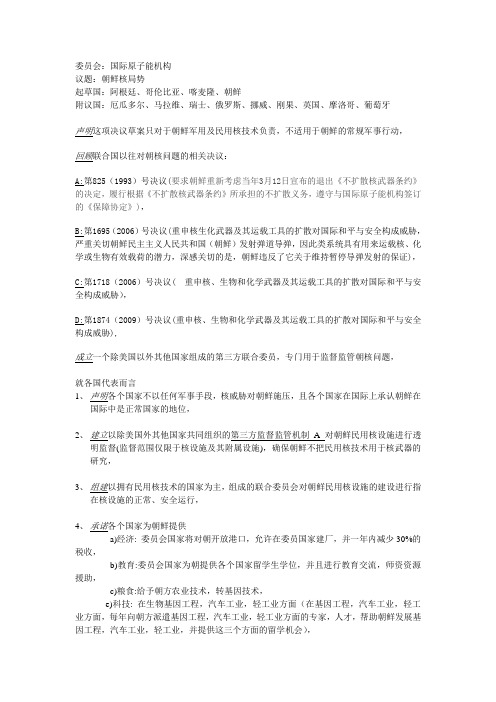
委员会:国际原子能机构议题:朝鲜核局势起草国:阿根廷、哥伦比亚、喀麦隆、朝鲜附议国:厄瓜多尔、马拉维、瑞士、俄罗斯、挪威、刚果、英国、摩洛哥、葡萄牙声明这项决议草案只对于朝鲜军用及民用核技术负责,不适用于朝鲜的常规军事行动,回顾联合国以往对朝核问题的相关决议:A:第825(1993)号决议(要求朝鲜重新考虑当年3月12日宣布的退出《不扩散核武器条约》的决定,履行根据《不扩散核武器条约》所承担的不扩散义务,遵守与国际原子能机构签订的《保障协定》),B:第1695(2006)号决议(重申核生化武器及其运载工具的扩散对国际和平与安全构成威胁,严重关切朝鲜民主主义人民共和国(朝鲜)发射弹道导弹,因此类系统具有用来运载核、化学或生物有效载荷的潜力,深感关切的是,朝鲜违反了它关于维持暂停导弹发射的保证),C:第1718(2006)号决议( 重申核、生物和化学武器及其运载工具的扩散对国际和平与安全构成威胁),D:第1874(2009)号决议(重申核、生物和化学武器及其运载工具的扩散对国际和平与安全构成威胁),成立一个除美国以外其他国家组成的第三方联合委员,专门用于监督监管朝核问题,就各国代表而言1、声明各个国家不以任何军事手段,核威胁对朝鲜施压,且各个国家在国际上承认朝鲜在国际中是正常国家的地位,2、建立以除美国外其他国家共同组织的第三方监督监管机制A对朝鲜民用核设施进行透明监督(监督范围仅限于核设施及其附属设施),确保朝鲜不把民用核技术用于核武器的研究,3、组建以拥有民用核技术的国家为主,组成的联合委员会对朝鲜民用核设施的建设进行指在核设施的正常、安全运行,4、承诺各个国家为朝鲜提供a)经济: 委员会国家将对朝开放港口,允许在委员国家建厂,并一年内减少30%的税收,b)教育:委员会国家为朝提供各个国家留学生学位,并且进行教育交流,师资资源援助,c)粮食:给予朝方农业技术,转基因技术,e)科技: 在生物基因工程,汽车工业,轻工业方面(在基因工程,汽车工业,轻工业方面,每年向朝方派遣基因工程,汽车工业,轻工业方面的专家,人才,帮助朝鲜发展基因工程,汽车工业,轻工业,并提供这三个方面的留学机会),f)基础设施建设: 帮助公路,铁路,港口方面建设等,5、呼吁国际社会中热爱和平,愿意以和平的方式永久解决朝核问题的国家,响应此份决议,共同支援朝鲜经济、教育、政治方面的建设,造福于朝鲜人民,并维护世界和平。
模拟联合国(MUN)文件范本之五:决议草案范本
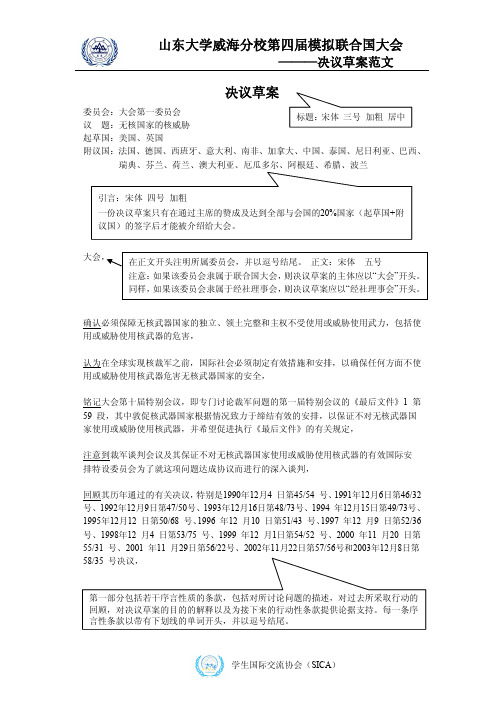
第一部分包括若干序言性质的条款,包括对所讨论问题的描述,对过去所采取行动的 回顾,对决议草案的目的的解释以及为接下来的行动性条款提供论据支持。每一条序 言性条款以带有下划线的单词开头,并以逗号结尾。
学生国际交流协会(SICA)
山东大学威海分校第四届模拟联合国大会
———决议草案范文
1、重申迫切需要早日就保证不对无核武器国家使用或威胁使用核武器的有效国际安排 达成协议; 2、满意地注意到裁军谈判会议中原则上没有人反对缔结一项国际公约以保证不对无核 武器国家使用或威胁使用核武器的设想,尽管也有人指出在研拟各方可以接受的共同办 法方面存在着困难; 3、呼吁所有国家,特别是核武器国家,就ห้องสมุดไป่ตู้同办法,特别是可载入具有法律约束力的 国际文书的共同方案,积极努力争取及早达成协议; 4、------------5、-------------
以上是行动性条款。行动性条款是有限的,它规定了将要采取的行动。这些条款都使 用现在时的主动语态,并且这里的用词要比序言性条款中的用词具有更强烈的语气。 除了最后一个条款以句号结尾外,其余条款均以分号结尾。
学生国际交流协会(SICA)
引言:宋体 四号 加粗 一份决议草案只有在通过主席的赞成及达到全部与会国的20%国家(起草国+附 议国)的签字后才能被介绍给大会。 大会,
在正文开头注明所属委员会,并以逗号结尾。 正文:宋体 五号 注意: 如果该委员会隶属于联合国大会, 则决议草案的主体应以“大会”开头。 同样, 如果该委员会隶属于经社理事会, 则决议草案应以“经社理事会”开头。
确认必须保障无核武器国家的独立、领土完整和主权不受使用或威胁使用武力,包括使 用或威胁使用核武器的危害, 认为在全球实现核裁军之前,国际社会必须制定有效措施和安排,以确保任何方面不使 用或威胁使用核武器危害无核武器国家的安全, 铭记大会第十届特别会议,即专门讨论裁军问题的第一届特别会议的《最后文件》1 第 59 段,其中敦促核武器国家根据情况致力于缔结有效的安排,以保证不对无核武器国 家使用或威胁使用核武器,并希望促进执行《最后文件》的有关规定, 注意到裁军谈判会议及其保证不对无核武器国家使用或威胁使用核武器的有效国际安 排特设委员会为了就这项问题达成协议而进行的深入谈判, 回顾其历年通过的有关决议, 特别是1990年12月4 日第45/54 号、 1991年12月6日第46/32 号、1992年12月9日第47/50号、1993年12月16日第48/73号、1994 年12月15日第49/73号、 1995年12月12 日第50/68 号、 1996 年12 月10 日第51/43 号、 1997 年12 月9 日第52/36 号、1998年12 月4 日第53/75 号、1999 年12 月1日第54/52 号、2000 年11 月20 日第 55/31 号、2001 年11 月29日第56/22号、2002年11月22日第57/56号和2003年12月8日第 58/35 号决议,
联合国对于朝鲜核问题的决议草案NO.1874
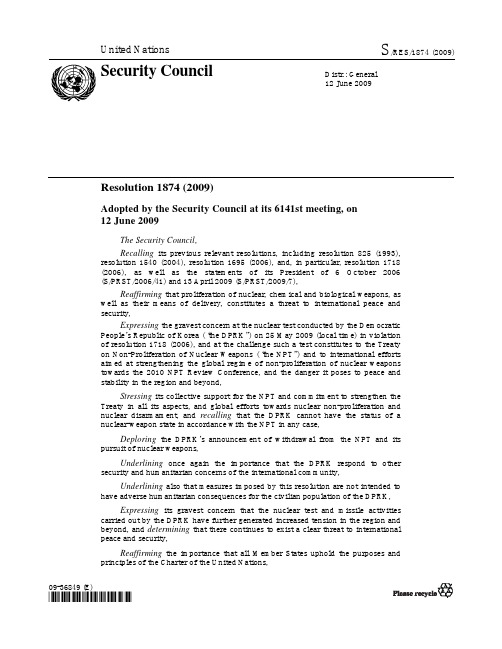
United Nations S/RES/1874 (2009) Security Council Distr.: General12 June 200909-36849 (E)Resolution 1874 (2009)Adopted by the Security Council at its 6141st meeting, on12 June 2009The Security Council,Recalling its previous relevant resolutions, including resolution 825 (1993), resolution 1540 (2004), resolution 1695 (2006), and, in particular, resolution 1718 (2006), as well as the statements of its President of 6 October 2006 (S/PRST/2006/41) and 13 April 2009 (S/PRST/2009/7),Reaffirming that proliferation of nuclear, chemical and biological weapons, as well as their means of delivery, constitutes a threat to international peace and security,Expressing the gravest concern at the nuclear test conducted by the Democratic People’s Republic of Korea (“the DPRK”) on 25 May 2009 (local time) in violation of resolution 1718 (2006), and at the challenge such a test constitutes to the Treaty on Non-Proliferation of Nuclear Weapons (“the NPT”) and to international efforts aimed at strengthening the global regime of non-proliferation of nuclear weapons towards the 2010 NPT Review Conference, and the danger it poses to peace and stability in the region and beyond,Stressing its collective support for the NPT and commitment to strengthen the Treaty in all its aspects, and global efforts towards nuclear non-proliferation and nuclear disarmament, and recalling that the DPRK cannot have the status of a nuclear-weapon state in accordance with the NPT in any case,Deploring the DPRK’s announcement of withdrawal from the NPT and its pursuit of nuclear weapons,Underlining once again the importance that the DPRK respond to other security and humanitarian concerns of the international community,Underlining also that measures imposed by this resolution are not intended to have adverse humanitarian consequences for the civilian population of the DPRK, Expressing its gravest concern that the nuclear test and missile activities carried out by the DPRK have further generated increased tension in the region and beyond, and determining that there continues to exist a clear threat to international peace and security,Reaffirming the importance that all Member States uphold the purposes and principles of the Charter of the United Nations,S/RES/1874 (2009)Acting under Chapter VII of the Charter of the United Nations, and taking measures under its Article 41,1. Condemns in the strongest terms the nuclear test conducted by the DPRKon 25 May 2009 (local time) in violation and flagrant disregard of its relevantresolutions, in particular resolutions 1695 (2006) and 1718 (2006), and thestatement of its President of 13 April 2009 (S/PRST/2009/7);2. Demands that the DPRK not conduct any further nuclear test or anylaunch using ballistic missile technology;3. Decides that the DPRK shall suspend all activities related to its ballisticmissile programme and in this context re-establish its pre-existing commitments to amoratorium on missile launches;4. Demands that the DPRK immediately comply fully with its obligationsunder relevant Security Council resolutions, in particular resolution 1718 (2006);5. Demands that the DPRK immediately retract its announcement ofwithdrawal from the NPT;6. Demands further that the DPRK return at an early date to the NPT andInternational Atomic Energy Agency (IAEA) safeguards, bearing in mind the rightsand obligations of States Parties to the NPT, and underlines the need for all StatesParties to the NPT to continue to comply with their Treaty obligations;7. Calls upon all Member States to implement their obligations pursuant toresolution 1718 (2006), including with respect to designations made by theCommittee established pursuant to resolution 1718 (2006) (“the Committee”)pursuant to the statement of its President of 13 April 2009 (S/PRST/2009/7);8. Decides that the DPRK shall abandon all nuclear weapons and existingnuclear programs in a complete, verifiable and irreversible manner and immediatelycease all related activities, shall act strictly in accordance with the obligationsapplicable to parties under the NPT and the terms and conditions of the IAEASafeguards Agreement (IAEA INFCIRC/403) and shall provide the IAEAtransparency measures extending beyond these requirements, including such accessto individuals, documentation, equipment and facilities as may be required anddeemed necessary by the IAEA;9. Decides that the measures in paragraph 8 (b) of resolution 1718 (2006)shall also apply to all arms and related materiel, as well as to financial transactions,technical training, advice, services or assistance related to the provision,manufacture, maintenance or use of such arms or materiel;Decides that the measures in paragraph 8 (a) of resolution 1718 (2006)10.shall also apply to all arms and related materiel, as well as to financial transactions,technical training, advice, services or assistance related to the provision,manufacture, maintenance or use of such arms, except for small arms and lightweapons and their related materiel, and calls upon States to exercise vigilance overthe direct or indirect supply, sale or transfer to the DPRK of small arms or lightweapons, and further decides that States shall notify the Committee at least fivedays prior to selling, supplying or transferring small arms or light weapons to theDPRK;S/RES/1874 (2009) Calls upon all States to inspect, in accordance with their national11.authorities and legislation, and consistent with international law, all cargo to andfrom the DPRK, in their territory, including seaports and airports, if the Stateconcerned has information that provides reasonable grounds to believe the cargocontains items the supply, sale, transfer, or export of which is prohibited byparagraph 8 (a), 8 (b), or 8 (c) of resolution 1718 or by paragraph 9 or 10 of this resolution, for the purpose of ensuring strict implementation of those provisions;Calls upon all Member States to inspect vessels, with the consent of the12.flag State, on the high seas, if they have information that provides reasonablegrounds to believe that the cargo of such vessels contains items the supply, sale,transfer, or export of which is prohibited by paragraph 8 (a), 8 (b), or 8 (c) ofresolution 1718 (2006) or by paragraph 9 or 10 of this resolution, for the purpose ofensuring strict implementation of those provisions;Calls upon all States to cooperate with inspections pursuant to13.paragraphs 11 and 12, and, if the flag State does not consent to inspection on thehigh seas, decides that the flag State shall direct the vessel to proceed to an appropriate and convenient port for the required inspection by the local authoritiespursuant to paragraph 11;Decides to authorize all Member States to, and that all Member States14.shall, seize and dispose of items the supply, sale, transfer, or export of which isprohibited by paragraph 8 (a), 8 (b), or 8 (c) of resolution 1718 or by paragraph 9 or10 of this resolution that are identified in inspections pursuant to paragraph 11, 12,or 13 in a manner that is not inconsistent with their obligations under applicableSecurity Council resolutions, including resolution 1540 (2004), as well as anyobligations of parties to the NPT, the Convention on the Prohibition of the Development, Production, Stockpiling and Use of Chemical Weapons and on Their Destruction of 29 April 1997, and the Convention on the Prohibition of the Development, Production and Stockpiling of Bacteriological (Biological) and ToxinWeapons and on Their Destruction of 10 April 1972, and decides further that allStates shall cooperate in such efforts;Requires any Member State, when it undertakes an inspection pursuant to15.paragraph 11, 12, or 13, or seizes and disposes of cargo pursuant to paragraph 14, tosubmit promptly reports containing relevant details to the Committee on the inspection, seizure and disposal;Requires any Member State, when it does not receive the cooperation of16.a flag State pursuant to paragraph 12 or 13 to submit promptly to the Committee areport containing relevant details;Decides that Member States shall prohibit the provision by their nationals17.or from their territory of bunkering services, such as provision of fuel or supplies, orother servicing of vessels, to DPRK vessels if they have information that providesreasonable grounds to believe they are carrying items the supply, sale, transfer, orexport of which is prohibited by paragraph 8 (a), 8 (b), or 8 (c) of resolution 1718(2006) or by paragraph 9 or 10 of this resolution, unless provision of such servicesis necessary for humanitarian purposes or until such time as the cargo has been inspected, and seized and disposed of if necessary, and underlines that thisparagraph is not intended to affect legal economic activities;S/RES/1874 (2009)Calls upon Member States, in addition to implementing their obligations18.pursuant to paragraphs 8 (d) and (e) of resolution 1718 (2006), to prevent theprovision of financial services or the transfer to, through, or from their territory, orto or by their nationals or entities organized under their laws (including branchesabroad), or persons or financial institutions in their territory, of any financial orother assets or resources that could contribute to the DPRK’s nuclear-related,ballistic missile-related, or other weapons of mass destruction-related programs oractivities, including by freezing any financial or other assets or resources on theirterritories or that hereafter come within their territories, or that are subject to theirjurisdiction or that hereafter become subject to their jurisdiction, that are associatedwith such programs or activities and applying enhanced monitoring to prevent allsuch transactions in accordance with their national authorities and legislation;Calls upon all Member States and international financial and credit19.institutions not to enter into new commitments for grants, financial assistance, orconcessional loans to the DPRK, except for humanitarian and developmentalpurposes directly addressing the needs of the civilian population, or the promotionof denuclearization, and also calls upon States to exercise enhanced vigilance with aview to reducing current commitments;20.Calls upon all Member States not to provide public financial support for trade with the DPRK (including the granting of export credits, guarantees orinsurance to their nationals or entities involved in such trade) where such financialsupport could contribute to the DPRK’s nuclear-related or ballistic missile-related orother WMD-related programs or activities;Emphasizes that all Member States should comply with the provisions of21.paragraphs 8 (a) (iii) and 8 (d) of resolution 1718 (2006) without prejudice to theactivities of the diplomatic missions in the DPRK pursuant to the ViennaConvention on Diplomatic Relations;Calls upon all Member States to report to the Security Council within22.forty-five days of the adoption of this resolution and thereafter upon request by theCommittee on concrete measures they have taken in order to implement effectivelythe provisions of paragraph 8 of resolution 1718 (2006) as well as paragraphs 9 and10 of this resolution, as well as financial measures set out in paragraphs 18, 19 and20 of this resolution;23.Decides that the measures set out at paragraphs 8 (a), 8 (b) and 8 (c) of resolution 1718 (2006) shall also apply to the items listed in INFCIRC/254/Rev.9/Part 1aand INFCIRC/254/Rev.7/Part 2a;Decides to adjust the measures imposed by paragraph 8 of resolution24.1718 (2006) and this resolution, including through the designation of entities,goods, and individuals, and directs the Committee to undertake its tasks to thiseffect and to report to the Security Council within thirty days of adoption of thisresolution, and further decides that, if the Committee has not acted, then theSecurity Council will complete action to adjust the measures within seven days ofreceiving that report;Decides that the Committee shall intensify its efforts to promote the full25.implementation of resolution 1718 (2006), the statement of its President of 13 April2009 (S/PRST/2009/7) and this resolution, through a work programme coveringcompliance, investigations, outreach, dialogue, assistance and cooperation, to beS/RES/1874 (2009) submitted to the Council by 15 July 2009, and that it shall also receive and considerreports from Member States pursuant to paragraphs 10, 15, 16 and 22 of this resolution;Requests the Secretary-General to create for an initial period of one year,26.in consultation with the Committee, a group of up to seven experts (“Panel of Experts”), acting under the direction of the Committee to carry out the followingtasks: (a) assist the Committee in carrying out its mandate as specified in resolution1718 (2006) and the functions specified in paragraph 25 of this resolution;(b) gather, examine and analyze information from States, relevant United Nationsbodies and other interested parties regarding the implementation of the measuresimposed in resolution 1718 (2006) and in this resolution, in particular incidents ofnon-compliance; (c) make recommendations on actions the Council, or the Committee or Member States, may consider to improve implementation of themeasures imposed in resolution 1718 (2006) and in this resolution; and (d) providean interim report on its work to the Council no later than 90 days after adoption ofthis resolution, and a final report to the Council no later than 30 days prior to termination of its mandate with its findings and recommendations;Urges all States, relevant United Nations bodies and other interested27.parties, to cooperate fully with the Committee and the Panel of Experts, in particularby supplying any information at their disposal on the implementation of themeasures imposed by resolution 1718 (2006) and this resolution;Calls upon all Member States to exercise vigilance and prevent28.specialized teaching or training of DPRK nationals within their territories or by theirnationals, of disciplines which could contribute to the DPRK’s proliferationsensitive nuclear activities and the development of nuclear weapon deliverysystems;Calls upon the DPRK to join the Comprehensive Nuclear-Test-Ban29.Treaty at the earliest date;Supports peaceful dialogue, calls upon the DPRK to return immediately30.to the Six Party Talks without precondition, and urges all the participants tointensify their efforts on the full and expeditious implementation of the JointStatement issued on 19 September 2005 and the joint documents of 13 February2007 and 3 October 2007, by China, the DPRK, Japan, the Republic of Korea, theRussian Federation and the United States, with a view to achieving the verifiable denuclearization of the Korean Peninsula and to maintain peace and stability on theKorean Peninsula and in north-east Asia;Expresses its commitment to a peaceful, diplomatic and political solution31.to the situation and welcomes efforts by Council members as well as other MemberStates to facilitate a peaceful and comprehensive solution through dialogue and torefrain from any actions that might aggravate tensions;Affirms that it shall keep the DPRK’s actions under continuous review32.and that it shall be prepared to review the appropriateness of the measures containedin paragraph 8 of resolution 1718 (2006) and relevant paragraphs of this resolution,including the strengthening, modification, suspension or lifting of the measures, asmay be needed at that time in light of the DPRK’s compliance with relevantprovisions of resolution 1718 (2006) and this resolution;S/RES/1874 (2009)Underlines that further decisions will be required, should additional33.measures be necessary;Decides to remain actively seized of the matter.34.。
模拟联合国朝核问题决议草案(英美韩)
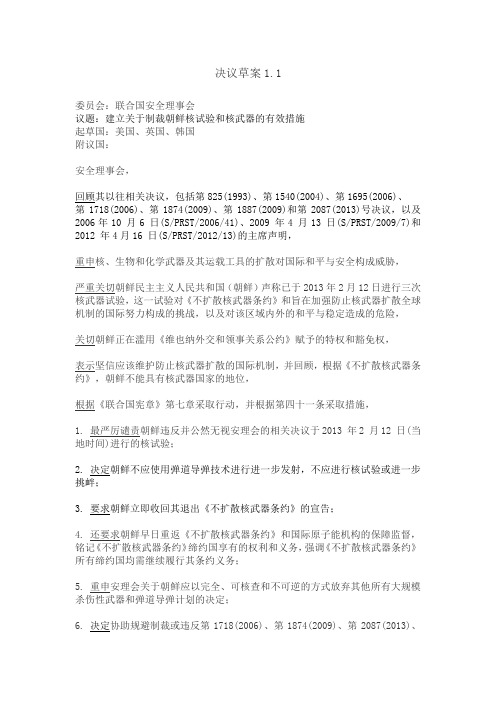
决议草案1.1委员会:联合国安全理事会议题:建立关于制裁朝鲜核试验和核武器的有效措施起草国:美国、英国、韩国附议国:安全理事会,回顾其以往相关决议,包括第825(1993)、第1540(2004)、第1695(2006)、第1718(2006)、第1874(2009)、第1887(2009)和第2087(2013)号决议,以及2006年10 月6 日(S/PRST/2006/41)、2009 年4 月13 日(S/PRST/2009/7)和2012 年4月16 日(S/PRST/2012/13)的主席声明,重申核、生物和化学武器及其运载工具的扩散对国际和平与安全构成威胁,严重关切朝鲜民主主义人民共和国(朝鲜)声称已于2013年2月12日进行三次核武器试验,这一试验对《不扩散核武器条约》和旨在加强防止核武器扩散全球机制的国际努力构成的挑战,以及对该区域内外的和平与稳定造成的危险,关切朝鲜正在滥用《维也纳外交和领事关系公约》赋予的特权和豁免权,表示坚信应该维护防止核武器扩散的国际机制,并回顾,根据《不扩散核武器条约》,朝鲜不能具有核武器国家的地位,根据《联合国宪章》第七章采取行动,并根据第四十一条采取措施,1. 最严厉谴责朝鲜违反并公然无视安理会的相关决议于2013 年2 月12 日(当地时间)进行的核试验;2. 决定朝鲜不应使用弹道导弹技术进行进一步发射,不应进行核试验或进一步挑衅;3. 要求朝鲜立即收回其退出《不扩散核武器条约》的宣告;4. 还要求朝鲜早日重返《不扩散核武器条约》和国际原子能机构的保障监督,铭记《不扩散核武器条约》缔约国享有的权利和义务,强调《不扩散核武器条约》所有缔约国均需继续履行其条约义务;5. 重申安理会关于朝鲜应以完全、可核查和不可逆的方式放弃其他所有大规模杀伤性武器和弹道导弹计划的决定;6.决定协助规避制裁或违反第1718(2006)、第1874(2009)、第2087(2013)、第2094(2013)和本决议的规定的个人,如果此人是朝鲜国民,则各国应根据适用的本国法律和国际法,将其驱逐出境以便遣返回朝鲜,除非为履行司法程序需要留在境内或留在境内完全是为了医疗、安全或其他人道主义目的;7. 决定所有会员国都不向对朝鲜贸易提供金融支持,如果这种金融支持有助于朝鲜的核计划或弹道导弹计划或第1718(2006)、第1874(2009)、第2087(2013)、第2094(2013)号决议或本决议禁止的其他活动,或有助于规避第1718(2006)、第1874(2009)、第2087(2013)、第2094(2013)号决议或本决议规定的措施;8. 决定各国应防止并阻止经过各自领土及管辖范围内通过空运、海运及陆运,直接或间接向朝鲜提供铀浓缩项目的相关物资、核活动有关技术资料、可供获得大量外汇的奢侈品等的行为;9. 决定冻结朝鲜与核工业相关的重要军工企业、科技部门、矿业企业、外贸公司在各国领土及管辖范围内的资产;10. 着重指出,第1718(2006)、第1874(2009)、第2087(2013)、第2094(2013)号决议和本决议规定的措施无意对朝鲜平民造成不利的人道主义后果;11. 表示承诺以和平、外交和政治方式解决当前局势,欢迎安理会成员及其他国家努力通过对话方式推动和平、全面的解决方案,避免采取任何可能使紧张局势升级的行动;12. 表示承诺当朝鲜停止其核活动并接受全面检查后,各国应在朝鲜的意愿下向朝鲜提供必要的经济和科技援助;13. 提议各国建立一个国际组织,在充分尊重朝鲜意愿的前提下展开对朝鲜主权与领土完整的保护,防止个别国家过分干预朝鲜事务;14. 申明安理会将继续审议朝鲜的行动,并愿意根据朝鲜的遵守情况,视需要加强、修改、暂停或解除这些措施,并就此表示决心在朝鲜再次进行发射或核试验时,采取进一步重要行动;15. 决定继续积极处理此案。
有关朝鲜问题立场文件(模联)
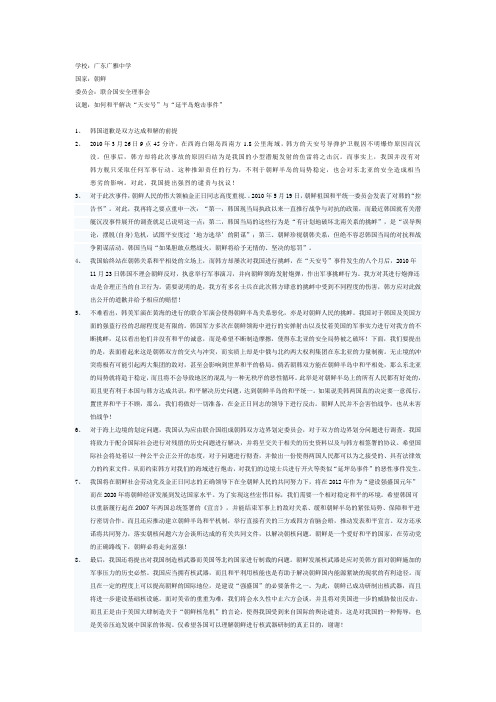
学校:广东广雅中学国家:朝鲜委员会:联合国安全理事会议题:如何和平解决“天安号”与“延平岛炮击事件”1、韩国道歉是双方达成和解的前提2、2010年3月26日9点45分许,在西海白翎岛西南方1.8公里海域,韩方的天安号导弹护卫舰因不明爆炸原因而沉没。
但事后,韩方却将此次事故的原因归结为是我国的小型潜艇发射的鱼雷将之击沉。
而事实上,我国并没有对韩方舰只采取任何军事行动。
这种推卸责任的行为,不利于朝鲜半岛的局势稳定,也会对东北亚的安全造成相当恶劣的影响。
对此,我国提出强烈的谴责与抗议!3、对于此次事件,朝鲜人民的伟大领袖金正日同志高度重视.。
2010年5月19日,朝鲜祖国和平统一委员会发表了对韩的“控告书”。
对此,我再将之要点重申一次:“第一,韩国现当局执政以来一直推行战争与对抗的政策,而最近韩国就有关潜艇沉没事件展开的调查就足已说明这一点;第二,韩国当局的这些行为是“有计划地破坏北南关系的挑衅”,是“误导舆论,摆脱(自身)危机,试图平安度过‘地方选举’的阴谋”;第三、朝鲜珍视朝韩关系,但绝不容忍韩国当局的对抗和战争阴谋活动。
韩国当局“如果胆敢点燃战火,朝鲜将给予无情的、坚决的惩罚”。
4、我国始终站在朝韩关系和平相处的立场上,而韩方却屡次对我国进行挑衅,在“天安号”事件发生的八个月后,2010年11月23日韩国不理会朝鲜反对,执意举行军事演习,并向朝鲜领海发射炮弹,作出军事挑衅行为。
我方对其进行炮弹还击是合理正当的自卫行为。
需要说明的是,我方有多名士兵在此次韩方肆意的挑衅中受到不同程度的伤害,韩方应对此做出公开的道歉并给予相应的赔偿!5、不难看出,韩美军演在黄海的进行的联合军演会使得朝鲜半岛关系恶化,亦是对朝鲜人民的挑衅。
我国对于韩国及美国方面的强盗行径的忍耐程度是有限的。
韩国军方多次在朝鲜领海中进行的实弹射击以及仗着美国的军事实力进行对我方的不断挑衅,足以看出他们并没有和平的诚意,而是希望不断制造摩擦,使得东北亚的安全局势被之破坏!下面,我们要提出的是,表面看起来这是朝韩双方的交火与冲突,而实质上却是中俄与北约两大权利集团在东北亚的力量制衡。
模拟联合国英文组决议草案
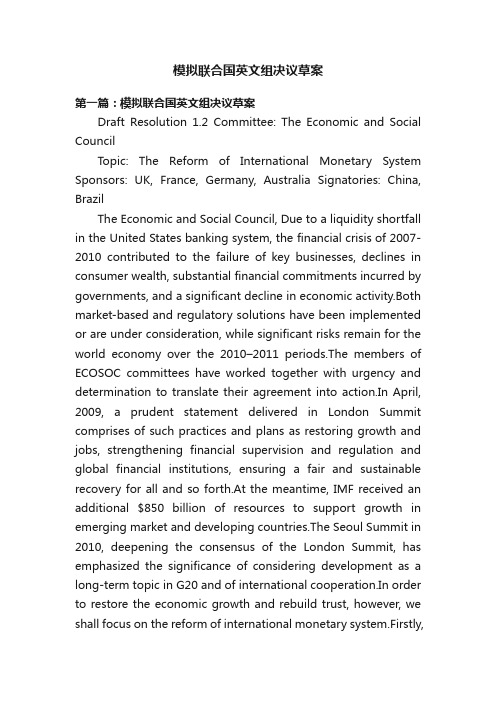
模拟联合国英文组决议草案第一篇:模拟联合国英文组决议草案Draft Resolution 1.2 Committee: The Economic and Social CouncilTopic: The Reform of International Monetary System Sponsors: UK, France, Germany, Australia Signatories: China, BrazilThe Economic and Social Council, Due to a liquidity shortfall in the United States banking system, the financial crisis of 2007-2010 contributed to the failure of key businesses, declines in consumer wealth, substantial financial commitments incurred by governments, and a significant decline in economic activity.Both market-based and regulatory solutions have been implemented or are under consideration, while significant risks remain for the world economy over the 2010–2011 periods.The members of ECOSOC committees have worked together with urgency and determination to translate their agreement into action.In April, 2009, a prudent statement delivered in London Summit comprises of such practices and plans as restoring growth and jobs, strengthening financial supervision and regulation and global financial institutions, ensuring a fair and sustainable recovery for all and so forth.At the meantime, IMF received an additional $850 billion of resources to support growth in emerging market and developing countries.The Seoul Summit in 2010, deepening the consensus of the London Summit, has emphasized the significance of considering development as a long-term topic in G20 and of international cooperation.In order to restore the economic growth and rebuild trust, however, we shall focus on the reform of international monetary system.Firstly,financial regulation and supervision are major concerns of the new monetary system;booming the economy, meanwhile, is the problem we now confronting with;and mulitiplorization of currency becomes the trend in international monetary system.This draft resolution aims at bettering international monetary system through three fundamental ways.To that end we claim the following points practical and crucial:1, Strengthening the supervision and regulation of international monetary system;(a)Constructing a flexible monetary system;(i)Undertake macroeconomic policies to ensure ongoing recovery and sustainable growth and enhance the stability of financial markets, in particular moving toward more market-determined exchange rate systems, enhancing exchange rate flexibility to reflect underlying economic fundamentals, and refraining from competitive devaluation of currencies.Advanced economies, including those with reserve currencies, will be vigilant against excess volatility and disorderly movements in exchange rates.These actions will help mitigate the risk of excessive volatility in capital flows facing some emerging countries;(ii)Reform international financial institution.IMF shall better reflect the changes in the world economy through greater representation of dynamic emerging markets and developing countries.These comprehensive quota and governance reforms will enhance the IMF’s legitimacy, credibility and effect iveness, making it an even stronger institution for promoting global financial stability and growth.(iii)Add core elements of a new financial regulatory framework, including bank capital and liquidity standards, as well as measures to better regulate and effectively resolve systemically important financial institutions,complemented by more effective oversight and supervision.This new framework will ensure a more resilient financial system by reining in the past excesses of the financial sector and better serving the needs of our economies.(b)Strengthen global financial safety nets;(i)Strengthen global financial safety nets, which help countries cope with financial volatility by providing them with practical tools to overcome sudden reversals of international capital flows.(ii)Continue to monitor and assess ongoing implementation of the commitments made today and in the past in a transparent and objective way.We hold ourselves accountable.What we promise, we will deliver.(iii)Better reflect the perspective of emerging market economies in financial regulatory reforms;strengthen regulation and oversight of shadow banking;further work on regulation and supervision of commodity derivatives markets;improve market integrity and efficiency;enhance consumer protection;pursue all outstanding governance reform issues at the IMF and World Bank;and build a more stable and resilient international monetary system, including by further strengthening global financial safety nets.We will also expand our MAP based on the indicative guidelines to be agreed.2.Booming the global economy;(a)Fighting protectionism and promoting trade and investment;(i)Keeping markets open and liberalizing trade and investment as a means to promote economic progress for all and narrow the development gap.These trade and investment liberalization measures will help the Framework objectives for strong, sustainable and balanced growth, and must be complemented by our unwavering commitment to resist protectionism in all its forms.(ii)Call on relevant international agencies to coordinate a collective multilateral response tosupport trade facilitation;and to support measures to increase the availability of trade finance in developing countries,(b)Creating more jobs;Improve the development of employable skills matched to employer and labor market needs in order to enhance the ability to attract investment, create decent jobs and increase productivity.We will support the development of internationally comparable skills indicators and the enhancement of national strategies for skills development.(c)Accelerating the development of the emerging market;Continuing the dynamic process aimed at enhancing the voice and representation of emerging market and developing countries, including the poorest, through a comprehensive review of the quota formula by January 2013 to better reflect the economic weights;and through completion of the next general review of quotas by January 2014.3.Establish a diversified international currency reserve system;(a)Consolidate the status of Euro.Eastern Europe, Southern Europe and the countries surrounding the Mediterranean Sea can peg the currency with the euro and even join the euro in the future.(b)Study the creation of “regional monetary units” and have made an agreement to regard the creation of regional currency units as one of the long-term goals to promote regional integration.(i)Rationally design of the process of RMB exchange rate system reform, based on the Asia-Pacific region to achieve the internationalization of RMB.(ii)Promote the internationalization of the yen.(c)The Latin American can use ruble in the area.4.Underlines that further decisions will be required, should additional measures be necessary;5.Decides to remain actively seized of the matter.湖南大学第三届模拟联合国大赛英文组第二篇:模拟联合国决议草案1泉州师范学院模拟联合国大会决议草案决议草案委员会:经济与社会理事会议题:加强联合国人道主义和救灾援助,促进世界和谐起草国:俄罗斯中国澳大利亚印度尼西亚叙利亚刚果伊拉克德国阿根廷马来西亚巴西墨西哥南非沙特阿拉伯附议国:菲律宾朝鲜经社理事会回顾1991年联合国大会通过的46/182号决议,要求加强在人道主义领域内的行动,并为此设立了人道主义事务部,还回顾其历年通过的有关决议,特别是2009年3月31日第64/6号、2008年7月25日第62/322号、2009年7月22日第64/84号决议,强调人道主义和救灾援助是建立在平等友好的基础上的,深信人道主义援助与救灾行动对于维护国际社会和谐稳定的重要意义,确保国际社会对灾害和紧急情况作出及时、连贯一致和协调的反应,并协助从紧急救济到复原与发展的顺利过渡,同意制订和推行联合国系统及其合作伙伴人道主义问题的共同政策,动员和协调人道主义紧急状况的援助,谴责一切附带政治性条款的人道主义援助与救灾措施的行为,认为联合国应发展和调动联合国加快提供国际人道主义援助的能力,泉州师范学院模拟联合国大会决议草案促进减少灾害风险,宣传人道主义问题,提供紧急状况和自然灾害的及时信息,以促进全球人道主义援助,重申在复杂紧急情况和自然灾害局势中提供人道主义援助的所有行为体都应推动和充分遵守人道、中立、公正和独立的人道主义原则,欣见于2008 年6月3日至5日在罗马举行世界粮食保障问题高级别会议,并指出执行其结果,包括关于人道主义援助的内容,认识到紧急情况、恢复和发展之间的明确关系,并重申提供紧急援助的方式应迅速、有执行力并且有助于复兴和长期发展,以保证救济工作平稳地过渡为恢复和发展工作,注意到1949年的《日内瓦公约》及相关的1977年《附加议定书》以及2005年关于新增特殊标志的《第三附加议定书》所组成的“国际人道法”所做的呼吁:“无论是作为个人,还是通过政府或各种组织,我们都可以对遵守国际人道法做出重要贡献。
模拟联合国朝鲜核问题立场文件
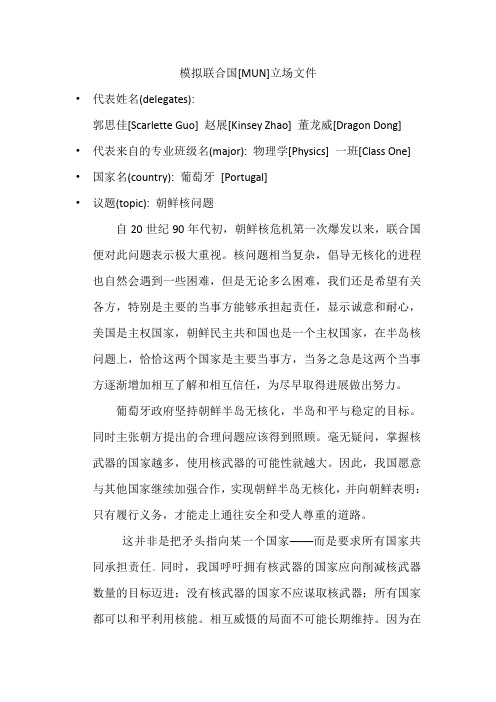
模拟联合国[MUN]立场文件•代表姓名(delegates):郭思佳[Scarlette Guo] 赵展[Kinsey Zhao] 董龙威[Dragon Dong] •代表来自的专业班级名(major): 物理学[Physics] 一班[Class One] •国家名(country): 葡萄牙[Portugal]•议题(topic): 朝鲜核问题自20世纪90年代初,朝鲜核危机第一次爆发以来,联合国便对此问题表示极大重视。
核问题相当复杂,倡导无核化的进程也自然会遇到一些困难,但是无论多么困难,我们还是希望有关各方,特别是主要的当事方能够承担起责任,显示诚意和耐心,美国是主权国家,朝鲜民主共和国也是一个主权国家,在半岛核问题上,恰恰这两个国家是主要当事方,当务之急是这两个当事方逐渐增加相互了解和相互信任,为尽早取得进展做出努力。
葡萄牙政府坚持朝鲜半岛无核化,半岛和平与稳定的目标。
同时主张朝方提出的合理问题应该得到照顾。
毫无疑问,掌握核武器的国家越多,使用核武器的可能性就越大。
因此,我国愿意与其他国家继续加强合作,实现朝鲜半岛无核化,并向朝鲜表明:只有履行义务,才能走上通往安全和受人尊重的道路。
这并非是把矛头指向某一个国家——而是要求所有国家共同承担责任。
同时,我国呼吁拥有核武器的国家应向削减核武器数量的目标迈进;没有核武器的国家不应谋取核武器;所有国家都可以和平利用核能。
相互威慑的局面不可能长期维持。
因为在21世纪,只有以强有力的全球性制度为基础,才能防范世界上最致命武器的威胁。
Since the beginning of 1990s of twenty century, the nuclear-weapon-free break out,the UN has pay a great attention to this problem. The nuclear issue on the Korean Peninsula is very complicated. Therefore naturally there will be difficulties in the process of the peace talks. No matter how difficult the process is, We still hope the relevant parties, particularly those major parties concerned can undertake their responsibilities, demonstrate flexibility, sincerity and patience The United States of America is a sovereign state, and so is the Democratic People's Republic of Korea. As to the nuclear issue on the Korean Peninsula, it is these two countries that are the major parties concerned. Therefore the pressing task is for these two parties directly concerned on the nuclear issue on the Korean Peninsula to gradually increase their mutual trust and mutual understanding.Portugal pursues the objective of a nuclear-weapon-free, peaceful and stable Korean Peninsula. At the same time, we also maintain that the legitimate concerns of the DPRK should be addressed.T he more nations acquire these weapons, the more likely it is that they will be used. That is why we must continue our collaboration to achieve the denuclearization of the KoreanPeninsula, and make it clear to North Korea that the path to security and respect can be traveled if they meet their obligations.This is not about singling out any one nation —— it is about the responsibility of all nations. And together, we must strengthen the Nuclear Non-Proliferation Treaty by renewing its basic bargain: countries with nuclear weapons will move towards disarmament; countries without nuclear weapons will not acquire them; and all countries can access peaceful nuclear energy. A balance of terror cannot hold.In the 21st century, a strong and global regime is the only basis for security from the world's deadliest weapons.。
朝核问题决议草案
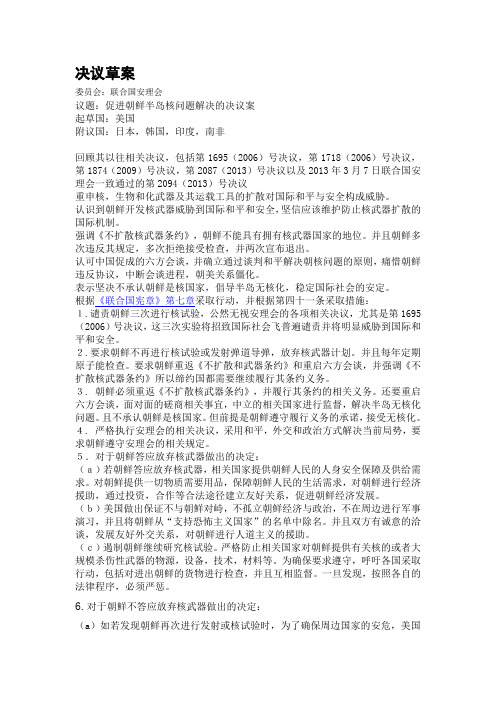
决议草案委员会:联合国安理会议题:促进朝鲜半岛核问题解决的决议案起草国:美国附议国:日本,韩国,印度,南非回顾其以往相关决议,包括第1695(2006)号决议,第1718(2006)号决议,第1874(2009)号决议,第2087(2013)号决议以及2013年3月7日联合国安理会一致通过的第2094(2013)号决议重申核,生物和化武器及其运载工具的扩散对国际和平与安全构成威胁。
认识到朝鲜开发核武器威胁到国际和平和安全,坚信应该维护防止核武器扩散的国际机制。
强调《不扩散核武器条约》,朝鲜不能具有拥有核武器国家的地位。
并且朝鲜多次违反其规定,多次拒绝接受检查,并两次宣布退出。
认可中国促成的六方会谈,并确立通过谈判和平解决朝核问题的原则,痛惜朝鲜违反协议,中断会谈进程,朝美关系僵化。
表示坚决不承认朝鲜是核国家,倡导半岛无核化,稳定国际社会的安定。
根据《联合国宪章》第七章采取行动,并根据第四十一条采取措施:1.谴责朝鲜三次进行核试验,公然无视安理会的各项相关决议,尤其是第1695(2006)号决议,这三次实验将招致国际社会飞普遍谴责并将明显威胁到国际和平和安全。
2.要求朝鲜不再进行核试验或发射弹道导弹,放弃核武器计划。
并且每年定期原子能检查。
要求朝鲜重返《不扩散和武器条约》和重启六方会谈,并强调《不扩散核武器条约》所以缔约国都需要继续履行其条约义务。
3. 朝鲜必须重返《不扩散核武器条约》,并履行其条约的相关义务。
还要重启六方会谈,面对面的磋商相关事宜,中立的相关国家进行监督,解决半岛无核化问题。
且不承认朝鲜是核国家。
但前提是朝鲜遵守履行义务的承诺,接受无核化。
4. 严格执行安理会的相关决议,采用和平,外交和政治方式解决当前局势,要求朝鲜遵守安理会的相关规定。
5.对于朝鲜答应放弃核武器做出的决定:(a)若朝鲜答应放弃核武器,相关国家提供朝鲜人民的人身安全保障及供给需求。
对朝鲜提供一切物质需要用品,保障朝鲜人民的生活需求,对朝鲜进行经济援助,通过投资,合作等合法途径建立友好关系,促进朝鲜经济发展。
模拟联合国立场文件

以下是立场文件应体现的参考内容中英皆可代表:学校:国家:委员会:议题 A:第一段:先用语言叙述议题的情况。
就像新闻报道一样,因为议题一般都与一个事件有关,例如有关金融危机的议题,就可以写2008几月国际市场怎样怎样再说些具体情况比如股价下跌等。
此段整体文件篇幅较短的时候可以用来拓展字数,但也不宜过长。
(我的这个就够长的了~ )一定要记住在这一段的最后提出本国的立场与观点,一般都说“XXX国认为XXX委员会仍有必要对各个解决方案的进行积极讨论,以增强现有措施的执行效果并制定更有效的方案。
”这类的话。
要不后面就没的说了。
第二段强调本国已经对该问题采取的措施及做出的努力。
这个需要上网查些资料并节选。
一定不能把一大堆的资料数据摊上去。
第三段简述联合国已经对该问题做出的努力以及该问题的到目前为止被解决的进程建议按时间顺序列出。
第四段这段简述国际社会,也就是其他国家对该问题做出的努力,可以赞扬可以谴责。
赞扬一般都是积极的措施,谴责既可以谴责一些国家的不得当的处理方式,也可以申明本国在对该问题做出努力和妥协的同时不希望伤害本国的利益打破本国的原则。
比如“但是意大利也发现部分伊拉克难民已通过非法渠道进入意大利境内,为了维护本国的整体治安和局势,并保证不再制造新的问题和事端,意大利不支持这种做法。
”第五段再次强调国际合作,可以用举例的方式列出一些国际组织,呼吁委员会及国际社会可以通过合作共同解决问题。
第六段以后就开始提建议了:建议可以多提,显得全面。
基本上针对不同的对象分为几个方面:联合国或该委员会和国家:其中国家也应分为几类:与议题争端有关的主要国家(比如朝核问题就是朝鲜)卷入纠纷的国家(比如美国韩国这些说要攻打朝鲜的)其他国家—---------这些国家中也可以考虑综合国力经济实力的因素分为强弱或以地域区分(比如欧盟和APEC)每个方面提三至五条就够了尽量全面结尾段就是稍微的升华一般都说这个问题的艰难性,以及解决可能需要痛苦的或漫长的过程。
模拟联合国决议草案范例
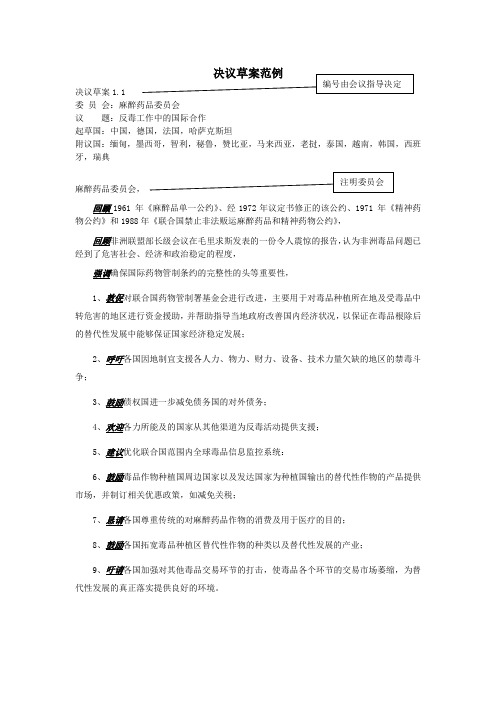
决议草案范例
决议草案1.1
委 员 会:麻醉药品委员会
议 题:反毒工作中的国际合作
起草国:中国,德国,法国,哈萨克斯坦
附议国:缅甸,墨西哥,智利,秘鲁,赞比亚,马来西亚,老挝,泰国,越南,韩国,西班牙,瑞典
麻醉药品委员会, 回顾1961 年《麻醉品单一公约》、经1972年议定书修正的该公约、1971 年《精神药物公约》和1988年《联合国禁止非法贩运麻醉药品和精神药物公约》,
回顾非洲联盟部长级会议在毛里求斯发表的一份令人震惊的报告,认为非洲毒品问题已经到了危害社会、经济和政治稳定的程度,
强调确保国际药物管制条约的完整性的头等重要性,
1、敦促对联合国药物管制署基金会进行改进,主要用于对毒品种植所在地及受毒品中转危害的地区进行资金援助,并帮助指导当地政府改善国内经济状况,以保证在毒品根除后的替代性发展中能够保证国家经济稳定发展;
2、呼吁各国因地制宜支援各人力、物力、财力、设备、技术力量欠缺的地区的禁毒斗争;
3、鼓励债权国进一步减免债务国的对外债务;
4、欢迎各力所能及的国家从其他渠道为反毒活动提供支援;
5、建议优化联合国范围内全球毒品信息监控系统:
6、鼓励毒品作物种植国周边国家以及发达国家为种植国输出的替代性作物的产品提供市场,并制订相关优惠政策,如减免关税;
7、恳请各国尊重传统的对麻醉药品作物的消费及用于医疗的目的;
8、鼓励各国拓宽毒品种植区替代性作物的种类以及替代性发展的产业;
9、吁请各国加强对其他毒品交易环节的打击,使毒品各个环节的交易市场萎缩,为替代性发展的真正落实提供良好的环境。
编号由会议指导决定
注明委员会。
模联决议草案范文英文
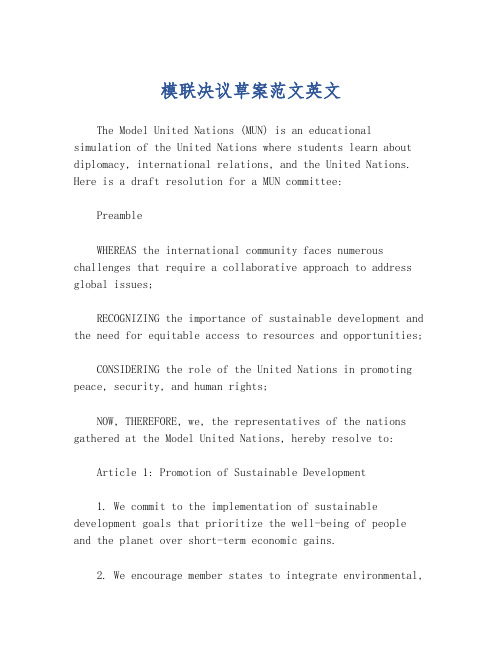
模联决议草案范文英文The Model United Nations (MUN) is an educational simulation of the United Nations where students learn about diplomacy, international relations, and the United Nations. Here is a draft resolution for a MUN committee:PreambleWHEREAS the international community faces numerous challenges that require a collaborative approach to address global issues;RECOGNIZING the importance of sustainable development and the need for equitable access to resources and opportunities;CONSIDERING the role of the United Nations in promoting peace, security, and human rights;NOW, THEREFORE, we, the representatives of the nations gathered at the Model United Nations, hereby resolve to:Article 1: Promotion of Sustainable Development1. We commit to the implementation of sustainable development goals that prioritize the well-being of people and the planet over short-term economic gains.2. We encourage member states to integrate environmental,social, and economic considerations into their nationalpolicies and strategies.Article 2: Access to Education1. We recognize the right to education as a fundamental human right and commit to improving access to quality education for all, regardless of gender, race, or socioeconomic status.2. We call upon developed nations to support educational initiatives in developing countries through financial and technical assistance.Article 3: Climate Change Mitigation1. We acknowledge the urgency of climate change and its adverse effects on the environment and human societies.2. We resolve to adopt and promote policies aimed at reducing greenhouse gas emissions and enhancing theresilience of communities to climate impacts.Article 4: Protection of Human Rights1. We reaffirm our commitment to the universal protection of human rights, including the rights to freedom of expression, assembly, and association.2. We urge all member states to enact and enforce lawsthat safeguard these rights and to hold violators accountable.Article 5: Strengthening International Peace and Security1. We emphasize the importance of peaceful resolution of conflicts and the role of diplomacy in preventing the escalation of disputes.2. We support the United Nations' efforts in conflict prevention, peacekeeping, and post-conflict reconstruction.Article 6: Support for Refugees and Displaced Persons1. We express our solidarity with refugees and displaced persons and acknowledge the challenges they face.2. We pledge to enhance support for host countries and to facilitate the integration of refugees into their new communities.Article 7: Enhancing Global Health Initiatives1. We recognize the global nature of health challenges and the need for a coordinated international response.2. We support the establishment of global health programs that focus on disease prevention, access to healthcare, and the development of vaccines and treatments.Article 8: Conclusion1. We call upon all member states to actively participatein the implementation of this resolution and to report ontheir progress at future Model United Nations sessions.2. We believe that through collective action and a shared commitment to these principles, we can build a more peaceful, just, and sustainable world.This draft resolution is intended to serve as a starting point for discussion and negotiation within the MUN committee, with the goal of reaching a consensus that reflects thediverse perspectives of the participating nations.。
模拟联合国大会流程-详细介绍模联MUN的规则-议题
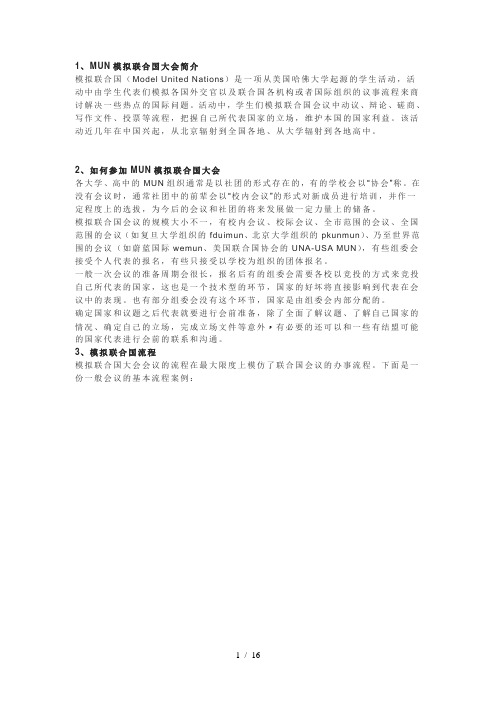
1、MUN模拟联合国大会简介模拟联合国(Model United Nations)是一项从美国哈佛大学起源的学生活动,活动中由学生代表们模拟各国外交官以及联合国各机构或者国际组织的议事流程来商讨解决一些热点的国际问题。
活动中,学生们模拟联合国会议中动议、辩论、磋商、写作文件、投票等流程,把握自己所代表国家的立场,维护本国的国家利益。
该活动近几年在中国兴起,从北京辐射到全国各地、从大学辐射到各地高中。
2、如何参加MUN模拟联合国大会各大学、高中的MUN组织通常是以社团的形式存在的,有的学校会以“协会”称。
在没有会议时,通常社团中的前辈会以“校内会议”的形式对新成员进行培训,并作一定程度上的选拔,为今后的会议和社团的将来发展做一定力量上的储备。
模拟联合国会议的规模大小不一,有校内会议、校际会议、全市范围的会议、全国范围的会议(如复旦大学组织的fduimun、北京大学组织的pkunmun)、乃至世界范围的会议(如蔚蓝国际wemun、美国联合国协会的UNA-USA MUN),有些组委会接受个人代表的报名,有些只接受以学校为组织的团体报名。
一般一次会议的准备周期会很长,报名后有的组委会需要各校以竞投的方式来竞投自己所代表的国家,这也是一个技术型的环节,国家的好坏将直接影响到代表在会议中的表现。
也有部分组委会没有这个环节,国家是由组委会内部分配的。
确定国家和议题之后代表就要进行会前准备,除了全面了解议题、了解自己国家的情况、确定自己的立场,完成立场文件等意外有必要的还可以和一些有结盟可能的国家代表进行会前的联系和沟通。
3、模拟联合国流程模拟联合国大会会议的流程在最大限度上模仿了联合国会议的办事流程。
下面是一份一般会议的基本流程案例:引用:1有组织核心磋商,代表须在动议中包含以下内容,即:想讨论的内容(topic)、磋商的总时间(totoal time)、每位代表的发言时间(individual time)。
模拟联合国活动策划

模拟联合国活动策划——关于朝鲜核试验问题决议一、活动背景2013年2月12日,朝鲜在北部地下核试验场进行了第三次核试验。
核试验引起国际社会强烈反应。
联合国安理会发表媒体声明,强烈谴责朝鲜进行第三次核试验,称朝方此举严重违反了安理会相关决议。
3月5日,联合国安理会召开会议,就朝鲜第三次核试验问题进行闭门磋商,并进行商讨制裁决议。
二、活动目的通过举行模拟联合国的活动,来增强同学们对于联合国组织结构、程序和功能的认识,增进其对于当前重大国际议题的理解认识,培养其形成以国际眼光看待问题的良好思维模式。
三、活动时间2013年6月18日(星期二)四、活动地点文B604五、活动安排1、前期准备将11级政教班分为六个组,六组分别代表美国、日本、中国、俄罗斯、韩国、朝鲜,并由抽签决定各组所代表的国家。
六组组长分别由两届班委成员各选派3名,每组7名组员,各组组员必须配合组长做好角色和发言顺序的分配,并根据自己所扮演的角色需求进行相关材料的收集和整理。
每个国家代表团由1名驻联合国代表,1名外交部处理朝鲜半岛问题官员和3名代表团成员组成,且六个代表团各分配2名记者组成会议记者团。
注:美国常驻联合国代表赖斯,日本常驻联合国代表高须幸雄,中国常驻联合国代表李保东,俄罗斯常驻联合国代表丘尔金,韩国常驻联合国代表金塾,朝鲜常驻联合国代表申善浩。
美国朝鲜问题特使戴维斯,日本外务省亚太局长杉山晋辅,中国副外长张志军,俄罗斯副外长阿列克谢·博罗达夫金,韩国外交通商部朝鲜半岛和平交涉本部长林圣男,朝鲜外务省副相李勇浩。
2、会议过程A、第一阶段:先由安理会六月份的轮值主席、英国常驻联合国代表格兰特(万芬饰)致欢迎词,介绍会议背景、流程以及相关注意事项。
B、第二阶段:陈述观点。
双方国家代表依次进行本国观点陈述。
根据所代表国家的利益和立场阐述本国对制定《朝鲜核安全制裁决议》的意见和建议。
C、第三阶段:协商谈判。
各国代表团就第二阶段的各国观点进行协商和谈判,并制定具体的制裁措施。
- 1、下载文档前请自行甄别文档内容的完整性,平台不提供额外的编辑、内容补充、找答案等附加服务。
- 2、"仅部分预览"的文档,不可在线预览部分如存在完整性等问题,可反馈申请退款(可完整预览的文档不适用该条件!)。
- 3、如文档侵犯您的权益,请联系客服反馈,我们会尽快为您处理(人工客服工作时间:9:00-18:30)。
决议草案1.1
委员会:联合国安全理事会
议题:建立关于制裁朝鲜核试验和核武器的有效措施
起草国:美国、英国、韩国
附议国:
安全理事会,
回顾其以往相关决议,包括第825(1993)、第1540(2004)、第1695(2006)、
第1718(2006)、第1874(2009)、第1887(2009)和第2087(2013)号决议,以及2006年10 月6 日(S/PRST/2006/41)、2009 年4 月13 日(S/PRST/2009/7)和2012 年4月16 日(S/PRST/2012/13)的主席声明,
重申核、生物和化学武器及其运载工具的扩散对国际和平与安全构成威胁,
严重关切朝鲜民主主义人民共和国(朝鲜)声称已于2013年2月12日进行三次核武器试验,这一试验对《不扩散核武器条约》和旨在加强防止核武器扩散全球机制的国际努力构成的挑战,以及对该区域内外的和平与稳定造成的危险,
关切朝鲜正在滥用《维也纳外交和领事关系公约》赋予的特权和豁免权,
表示坚信应该维护防止核武器扩散的国际机制,并回顾,根据《不扩散核武器条约》,朝鲜不能具有核武器国家的地位,
根据《联合国宪章》第七章采取行动,并根据第四十一条采取措施,
1. 最严厉谴责朝鲜违反并公然无视安理会的相关决议于2013 年2 月12 日(当地时间)进行的核试验;
2. 决定朝鲜不应使用弹道导弹技术进行进一步发射,不应进行核试验或进一步挑衅;
3. 要求朝鲜立即收回其退出《不扩散核武器条约》的宣告;
4. 还要求朝鲜早日重返《不扩散核武器条约》和国际原子能机构的保障监督,铭记《不扩散核武器条约》缔约国享有的权利和义务,强调《不扩散核武器条约》所有缔约国均需继续履行其条约义务;
5. 重申安理会关于朝鲜应以完全、可核查和不可逆的方式放弃其他所有大规模杀伤性武器和弹道导弹计划的决定;
6.决定协助规避制裁或违反第1718(2006)、第1874(2009)、第2087(2013)、
第2094(2013)和本决议的规定的个人,如果此人是朝鲜国民,则各国应根据适用的本国法律和国际法,将其驱逐出境以便遣返回朝鲜,除非为履行司法程序需要留在境内或留在境内完全是为了医疗、安全或其他人道主义目的;
7. 决定所有会员国都不向对朝鲜贸易提供金融支持,如果这种金融支持有助于朝鲜的核计划或弹道导弹计划或第1718(2006)、第1874(2009)、第2087(2013)、第2094(2013)号决议或本决议禁止的其他活动,或有助于规避第1718(2006)、第1874(2009)、第2087(2013)、第2094(2013)号决议或本决议规定的措施;
8. 决定各国应防止并阻止经过各自领土及管辖范围内通过空运、海运及陆运,直接或间接向朝鲜提供铀浓缩项目的相关物资、核活动有关技术资料、可供获得大量外汇的奢侈品等的行为;
9. 决定冻结朝鲜与核工业相关的重要军工企业、科技部门、矿业企业、外贸公司在各国领土及管辖范围内的资产;
10. 着重指出,第1718(2006)、第1874(2009)、第2087(2013)、第2094(2013)号决议和本决议规定的措施无意对朝鲜平民造成不利的人道主义后果;
11. 表示承诺以和平、外交和政治方式解决当前局势,欢迎安理会成员及其他国家努力通过对话方式推动和平、全面的解决方案,避免采取任何可能使紧张局势升级的行动;
12. 表示承诺当朝鲜停止其核活动并接受全面检查后,各国应在朝鲜的意愿下向朝鲜提供必要的经济和科技援助;
13. 提议各国建立一个国际组织,在充分尊重朝鲜意愿的前提下展开对朝鲜主权与领土完整的保护,防止个别国家过分干预朝鲜事务;
14. 申明安理会将继续审议朝鲜的行动,并愿意根据朝鲜的遵守情况,视需要加强、修改、暂停或解除这些措施,并就此表示决心在朝鲜再次进行发射或核试验时,采取进一步重要行动;
15. 决定继续积极处理此案。
